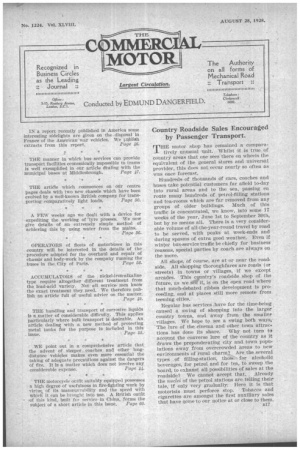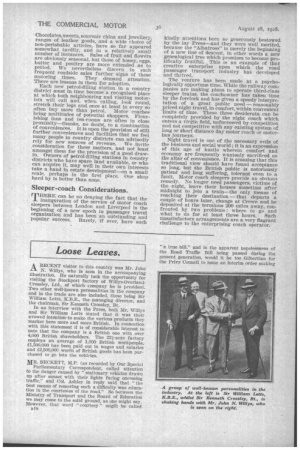Country Roadside Sales Encouraged by Passenger Transport.
Page 1

Page 2

If you've noticed an error in this article please click here to report it so we can fix it.
THE motor shop has remained a comparatively unusual unit. Whilst it is true of country areas that one sees there on wheels the equivalent of the general stores and universal provider, this does not occur nearly so often as was once forecast.
Hundreds of thousands Of cars, coaches and buses take potential customers far afield to-day into rural areas and to the sea, passing en route many hundreds of petrol-filling stations and tea-rooms which are far removed from any groups of older buildings. Much of this traffic is concentrated, we know, into some 17 weeks of the year, ,Tune 1st to September 30th, but by no means all. There is a very considerable volume of all-the-year-round travel by road to be served, with peaks at week-ends and during spasms of extra good weather. Even if winter bus-service traffic be chiefly for business reasons, special parties by coach are always on the move.
All shops, of course, are at or near the road. side. All shopping thoroughfares are roads (or streets) in towns or villages, if we except arcades. This. eguntry's roadside shop of the future, as we 8 'ffit, is on the openroad where that much-debated ribbon development is proceeding, and at places still more remote from teeming cities.
Begular bus ,services have for the time-being caused a swing of shopping into the larger country towns, and away from the smaller villages. We hope to see a swing both ways. The lure of the cinema and other town attractions, has done its share. Why not turn to account the converse lure of the country as it 'draws the preponderating city and town populations away from overcrowded areas to new environments of rural charm? Are the several types of those for alcoholic beverages, for petrol and for tea, to sweep the board., to exhaust all possibilities of sales at the roadside? We cannot accept that. . Already the nuclei of the petrol stations are telling their tale, if only very gradually; Here it is that motorists must perforce stop. Tobacco and cigarettes are amongst the first auxiliary sales that have tome to our notice at or close to them. Chocolates, sweets, souvenir china and jewellery, ranges of leather goods, and a wide choice of non-perishable articles, have ,so far appeared somewhat tardily, and in a relatively small number of instances. Sales of fruit and flowers are obviously seasonal, but those of honey, eggs, butter and poultry are more extended as to period. We nevertheless discern in such frequent roadside sales further signs of these motoring times. They demand attention. There are lessons in them for adoption.
Each new petrol-filling station in a country district must in time become a recognised place at which both neighbouring and visiting motorists will call and, when calling, look round, stretch their legs and once at least in every so often buy more than petrol. Motor coaches bring multitudes of potential shoppers. Flourishing inns and tea-rooms are often in close proximity—thanks, no doubt, to a combination of conveniences. It is upon the provision of still further conveniences and facilities that we feel many people in country districts can advisedly rely for new sources of revenue. We invite consideration for these matters, and not least amongst them for the provision of a good drawin. Owners of petrol-filling statiOns in country districts who have spare land available, or who can acquire it, may well in their own interests take a hand in estate development—on a small scale, perhaps in the first place. One shop hard by is better than none.
Sleeper-coach Considerations.
THERE can be no denying the fact that the inauguration of the service of motor coach sleepers between London and Liverpool is the , beginning of a new epoch in passenger travel organization and has been an outstanding and popular success. Rarely, if ever, have such kindly attentions been so generously bestowed by the lay Press—and they were well merited, because the "Albatross" is merely the beginning of a new line of descent, in other words a new genealogical tree which promises to become prolifically fruitful. 4 This is an example of that creative enterprise upon which the road passenger transport industry has developed and thrived.
The venture has been made at a psychologically opportune time. While the railway companies are making plans to operate third-class sleeper trains, the coachowner has taken time by the forelock and has given a speedy Interpretation . of a great public need — reasonably priced night travel, in comfort, within convenient 'limits of time. These three desiderata can be completely provided by the night coach which enters a virgin field, unfurrowed by competition and not competitive with any existing system of long or short distance day motor coach or motorbus journeys.
Night travel is one of the necessary evils of the business and social world ; it is an expression of this age of hustle wherein comfort and economy are frequently wantonly sacrificed on the altar of convenience. It is amazing that this traditional view should have found acceptance so long, but the British public is notoriously patient and long suffering, tolerant even to a fault. Motor coach sleepers provide an obvious remedy. No longer need passengers, victims of the night, leave their houses sometime after midnight to join a train--the only means of reaching their destination — that departs a couple of hours later, change at Crewe and be deposited at the terminus 200 miles. away, confronted by two problems : where to go and what to do for at least three hours. Such unsatisfactory arrangements are a very flagrant challenge to the enterprising coach operator.
































